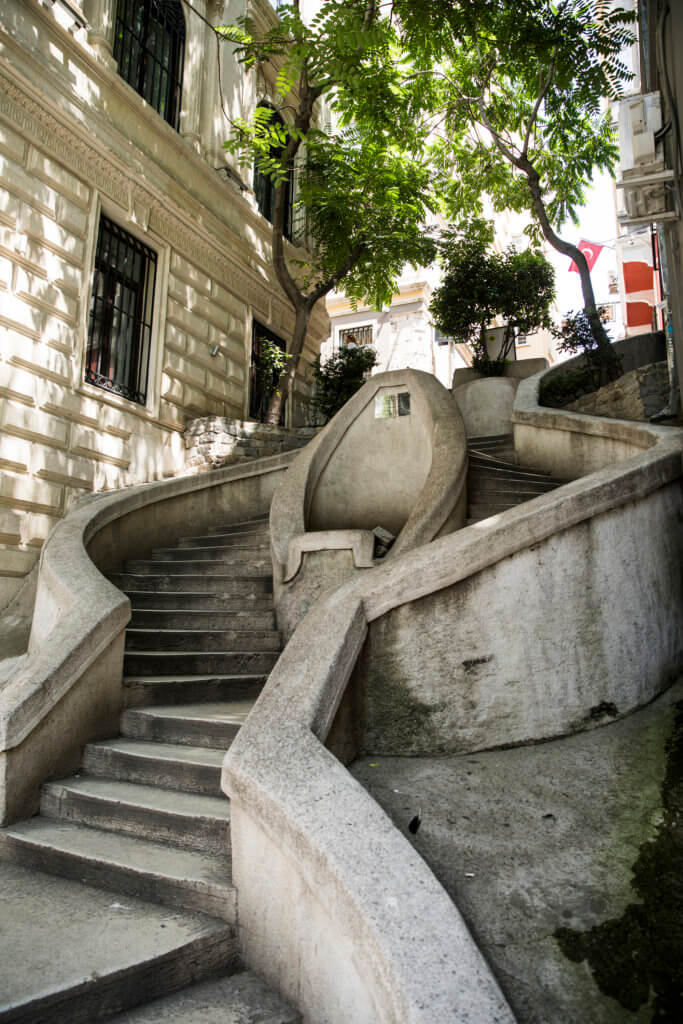THE CAMONDO STEPS
Connecting the Banks Avenue (Bankalar Caddesi) to the upper parts of Karaköy, the Camondo (Kamondo) steps were built in the 1850s by one of the most important families of the area – that is, the Camondo family. Constructed as a short-cut for the family on their way from home to school and work, the steps also came to serve those who had workplaces in Galata and lived in Pera. Remarkable for their curvaceous design, these steps were built in an eclectic style consisting of a combination of neoclassical and imperial styles.
The Camondo family settled in Venice escaping the Spanish Inquisition in the 15th century and then came to Istanbul in the 17th century. They were a family of bankers. The bank established by Isaac and Abraham Solomon was called “Isaac Camondo & Cie” (“İshak Kamondo ve Şürekası”). It flourished before long, and became one of the reputable international institutions of its day. After Isaac’s death, Abraham Solomon took over the business and obtained certain privileges due to his being financial advisor to the Ottoman palace. Abraham Solomon Camondo is considered one of the founders of modern banking in Istanbul. In addition to playing an important role in relations between the Jewish community and the Sublime Porte (Babıali), he also spearheaded the transformation of Galata into a modern finance center in the 19th century. The Camondos combined forces with some other Galata bankers to establish the “Société Générale de l’Empire Ottoman”. They were also among the partners of the Şirket-i Hayriye (Ottoman Sea Line Company) and the Istanbul (Dersaadet) Tramway Company started by Grand Vizier Mustafa Reşid Pasha. The contributions of the Camondo family to Istanbul’s modernization were not limited to this either. Their role in the establishment of Istanbul’s very first municipality – i.e. the Sixth District Municipality (Altıncı Daire-i Belediye), in the development of the transport system, and the modernization of the Galata region, in particular, was indeed quite sizable.
Towards the end of the 19th century, the Camondo brothers decided to settle in Paris thinking the bank should open up to the rest of the world. Abraham Solomon Camondo died in 1873 shortly after settling in Paris and was honoured with a grand state funeral, being interred in a mausoleum he had built in the Hasköy Jewish Cemetery. While the entire city mourned the day of his funeral, the stock market and finance institutions were closed, the shopkeepers of Galata and Haliç shut down their stores, and even churches rung their bells.
As for how this well-established family petered out: Abraham Solomon’s great-grandchild Nissim Camondo took French citizenship towards the end of the 19th century as anti-Semitism was on the rise and later died in World War I. Nissim’s sister Beatrice died in Auschwitz with her husband and two children. The only member of the Camondo family remaining alive by the time the war had ended was Irène Cahen, mother of Nissim and Beatrice. She managed to survive the Holocaust having converted to Catholicism after getting divorced from Moise Camondo, and inherited the entire family estate.
The Camondo family also made great contributions to the Parisian art world. Abraham Behor’s son Isaac Camondo was part of the founding of the Champs-Élysees National Theater, while Nissim Camondo’s son Moise Camondo had the Nissim Camondo Museum launched. Carrying on his father’s tradition and becoming one of the most distinguished collectioners of Paris, Isaac Camondo later bequeathed his collection of impressionist paintings to the Louvre Museum. Moise Camondo, on the other hand, left his mansion and collection of 18th-century works of art to the Union des Arts Decoratifs for the establishment of the Nissim Camondo Museum, which is still in operation in Paris today.
The Camondo family built countless structures that left their mark on Istanbul, which are largely still in existence even if mostly in a decrepit state. Among these it is possible to mention the Northern Sea Area Command (Kuzey Deniz Saha Komutanlığı) headquarters in Kasımpaşa, the Galata Résidence, the Camondo Inn on Serdar-ı Ekrem Street, Büyükada Inn on Meşrutiyet Avenue, and the Saatçi Inn, Latif Inn, Lacivert Inn, Yakut Inn, Kuyumcular Inn, Lüleci Inn and Gül Inn in Karaköy.
